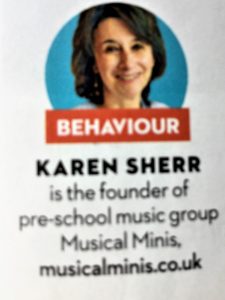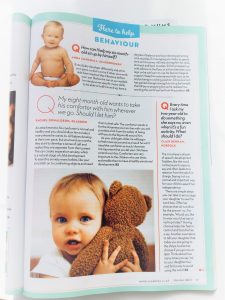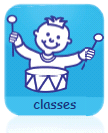 As a psychologist, former play specialist at Great Ormond Street Hospital, Mum to 3 grown up children and founder of Musical Minis, a nationwide pre-school music group based on child development, I am often asked for my views on various subjects. Recently I was asked to share parenting advice to answer readers problems in Mother and Baby Magazine.
As a psychologist, former play specialist at Great Ormond Street Hospital, Mum to 3 grown up children and founder of Musical Minis, a nationwide pre-school music group based on child development, I am often asked for my views on various subjects. Recently I was asked to share parenting advice to answer readers problems in Mother and Baby Magazine.
Here are the questions and my answers:
Every time I ask my two-year-old to do something, she says no, even when it’s a fun activity. What should I do?
The ‘no’ phase is all part of your child’s speech development although it is frustrating for parents. Toddlers like the word ‘no’ because it’s easy to say and often leads to a reaction from the adult in charge. Saying “no” is a healthy, normal and important way for your child to assert their new found independence. There are simple steps you can take to encourage your daughter to use the word ‘no’ less. Offer your daughter choices that do not allow for the answer ‘no’. For example, “Would you like to wear your blue jumper or red jumper today?” Giving your toddler choices helps her feel in control and that she has a say in decisions. Another example is to tell your daughter that today you are going to the shops but let her choose if you go now or later. Think about how many times you say ‘no’ to your daughter. Try to say things in a different way so that you avoid using the word ‘no’. As with all phases your daughter will grow out of saying ‘no’ but by offering choices and asking questions that don’t allow for a ‘no’ answer, you can encourage her to use it less!

My eight-month-old has suddenly got very attached to his comforter and wants to take it everywhere. Should I let him?
An attachment to his comforter is normal and healthy and you should allow him to take it everywhere. All babies develop at their own pace but at around six months they start to develop a sense of self and realise they are separate from their parent. This can create separation anxiety which is a stage of child development. To ease this anxiety many babies latch on to “comfort objects”. Your son has developed a strong attachment to his comforter and needs it to feel safe. The comforter stands in for the closeness your son has with you and provides a link from the safety of being with you to the big world around him. Comforters help children to deal better with times of separation, stress or anxiety. As children get older they are able to feel more secure and need the comforter less, however, it is important for the child to have control over this. Comforters are very important to the children who use them and enable them to have a healthy emotional development.
How can I encourage my six-month-old son to sit up by himself?
It is important to realise that every baby develops differently and at their own pace, so don’t worry if other 6 month olds have reached this milestone before your son. However, there are ways you can help your son learn how to sit up himself. Babies need some specific motor skills before they can sit up unaided. They need to be able to hold their neck up, have some balance and develop trunk muscles. By encouraging your baby to spend time playing on his tummy, it will help strengthen his neck, stomach and back muscles. You can sit your son propped up with pillows on the floor or sit him between your legs. He will learn to use his feet and legs as support and will begin to sit upright with help. At first he will be wobbly as babies need to learn balance before being able to sit alone. Keep your son entertained with toys so he will enjoy being in a sitting position. Once your son has gained enough strength to sit up himself there will be no stopping him as he realises how exciting the world can be from this position.
If you have a question about your child that you would like answered please email karen@musicalminis.co.uk.




